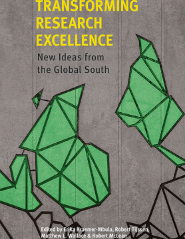This recently released book takes a critical view of conceptual issues and practical problems that inevitably emerge when 'excellence' takes center stage in science systems in the Global South. What is 'excellent science'? And how to recognize and assess it? After decades of inquiry and debate there is still no satisfactory answer.
 Confronting sticky problems and uncomfortable truths, it contains many insights and recommendations that point towards new solutions. Emerging from the capacity-building work of the Science Granting Councils Initiative (SGCI) in sub-Saharan Africa, the book speaks to scholars as well as to managers and funders of scientific research in lower or middle-income countries of the Global South.
Confronting sticky problems and uncomfortable truths, it contains many insights and recommendations that point towards new solutions. Emerging from the capacity-building work of the Science Granting Councils Initiative (SGCI) in sub-Saharan Africa, the book speaks to scholars as well as to managers and funders of scientific research in lower or middle-income countries of the Global South.
The 287-page edited volume comprises three main parts and a total of 16 chapters. The fourth chapter, by Robert Tijssen, entitled "Re-valuing research excellence: From excellentism to responsible assessment" presents a critical review of current misuse of the term excellence and suggests ways of implementation that are better suited for resource-constrained science systems in low-income countries. The final chapter contains a collective call for action to adopt a 'smarter' view of excellence and implement key recommendations made in this volume - lessons that may apply to both the Global South and Global North.
"Transforming Research Excellence" is an open access book which was published in January 2020 by African Minds (Cape Town, South Africa). The entire work, as well as its separate chapters, can be downloaded for free, as a full-text pdf file, from:






